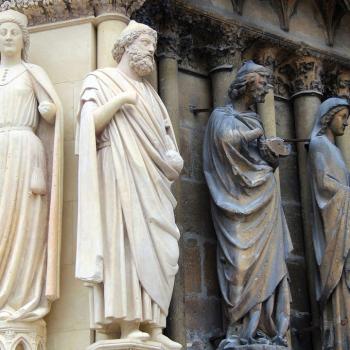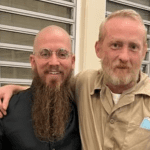Left Behind, pp. 443-448
In the final pages of the penultimate chapter of Left Behind, Jerry Jenkins tries to ratchet up the suspense before Buck Williams’ encounter with the Antichrist.
The supposedly suspenseful questions — Will Buck get saved? Is Nicolae the Antichrist? Or is it really Stonagal? — aren’t all that suspenseful. The answers are thuddingly obvious (yes, yes and no, duh, respectively). Yet despite that, the conclusion of this book does involve a bit of suspense. After 400+ pages of non-sequitur plot developments, inconsistent characterization and glaring continuity errors, the reader approaches the end of this book with the realization that anything, absolutely anything, might happen. Since the normal rules of plot, character, motive, logic, physics, human nature, and cause and effect do not apply then anything goes.
Bruce Barnes warned that the Antichrist is planning some “show of strength,” something big. In a normal book, that would seem ominous, but we have no idea what to make of such a suggestion here in the world of L.B. In this world, no one seems particularly impressed by a nuclear holocaust or the disappearance of every child from earth, yet the sight of two guys tripping and dying held the entire planet spellbound. In such a deliriously strange world, readers have no way of knowing what a “show of strength” might mean. That provides suspense, of a sort, just not the kind the authors seem to intend.
Buck’s credentials were waiting for him at an information desk in the U.N. lobby. He was directed up to a private conference room off the suite of offices into which Nicolae Carpathia had already moved. Buck was at least 20 minutes early, but as he emerged from the elevator he felt alone in a crowd. He saw no one he recognized as he began the long walk down a corridor of glass and steel leading to the room where he was to join Steve, the 10 designated ambassadors representing the permanent members of the new Security Council, several aides and advisers to the new secretary-general (including Rosenzweig, Stonagal, and various other members of his international brotherhood of financial wizards), and of course, Carpathia himself.
So Buck is headed for a room full of people, at least 20, most of whom he has never seen before. And here he is walking down the hallway to that room and the hallway is full of people he has never seen before. Yet somehow Buck knows that these unrecognizable strangers are a different set of unrecognizable strangers. So who are all these people in the hall and what are they doing there? Don’t worry about that. They’re just Other People, and if there’s one thing we’ve learned from Left Behind, it’s that Other People don’t matter.
We’re about to get another four pages of Buck in anxious, fretting, full-of-dread mode. Since Buck is also Jenkins’ Mary Sue surrogate, this description needs yet again to be prefaced with a disclaimer reminding readers that Buck is a manly man’s man and that all of this fear and worry should in no way be interpreted as suggesting that he is anything other than a hard-charging, vigorous alpha male.
Buck had always been energetic and confident. Others had noticed his purposeful stride on assignment. …
Keep in mind this is Buck’s perspective here. We never read of those others actually noticing his purposeful stride, energy and confidence. All we read is his assumption that his must be something others must have noticed about him.
This is all you really need to know about Buck (or about Rayford Steele, for that matter). Will Ferrell has made a career out of playing this exact character — the self-centered incompetent with epically disproportionate self-confidence. Buck is just like any of those interchangeable Ferrell characters — Ricky Bobby, Ron Burgundy, George W. Bush. (Tell me you can’t hear Bush’s voice saying this: “Others have noticed mah … purp-oseful strad.”)
Others had noticed his purposeful stride on assignment. Now his gait was slow and unsure, and with every step his dread increased. The lights seemed to grow dimmer, the walls close in. His pulse increased and he had a sense of foreboding.
There are several more paragraphs of this —
What he feared, he knew, was not mortal danger. At least not now, not here. The closer he got to the conference room, the more he was repelled by a sense of evil, as if personified in that place. … He was nearly paralyzed by the atmosphere of blackness. He wanted to be anywhere but there. … he felt the darkest anguish of his soul …
We get two full pages of this overheated, Lovecraftian dread between the elevator and the door to the conference room. Somewhere in the midst of all that: “Buck found himself silently praying, God, be with me. Protect me.” And then, on the following page:
He tried to force himself toward the door, his thoughts deafening. Again he cried out to God, and he felt a coward — just like everyone else, praying in the foxhole. …
Yet he did not belong to God. Not yet.
Buck is still standing in the hallway when Steve Plank finally spots him.
“Buck! We’re almost ready to begin. Come on in.”
But Buck felt terrible, panicky. “Steve, I need to run to the washroom. Do I have a minute?”
Steve glanced at his watch. “You’ve got five,” he said.
The last time these two spoke, Steve was darkly hinting that Buck shouldn’t ask too many questions about the group assembled for this meeting or both of their lives might be in danger. Steve was so spooked in that conversation that he wouldn’t even mention Carpathia or Stonagal by name. “Staten Island,” he had warned Buck. “Staten Island!“
Here, however, Steve seems chipper and carefree. He-Who-Must-Not-Be-Named and He-Who-Must-Not-Be-Named-Either are just a few yards away, but this no longer seems to trouble him.
Lots of thrillers feature just this sort of unsettling shift from whispering coded warnings to cheery bonhomie. The mysterious stranger full of ominous threats in the previous scene is now smiling broadly, but the smile seems a bit forced and he seems to be stealing furtive glances over his shoulder. Or there’s the Stepford/Body Snatchers variation, in which the now cheerful character seems genuinely puzzled by any reference to their earlier warnings. Such devices are so familiar that at first one suspects something like that was intended here.
But it’s not. This is just more Bad Writing.
You’ll recall that ever since Buck got off the phone with Steve he’s been trying to figure out what exactly his old boss had meant by “he moves mountains.” Was that a reference to Carpathia or to Stonagal? Here’s his chance to ask Steve which he meant, and to ask him some of the other questions Buck urgently needs answered before he goes into that meeting. Yet he doesn’t ask any of those questions. He doesn’t mention their previous conversation at all. Like Steve — and the authors — Buck seems to have forgotten that conversation even took place.
A bit of accidental realism follows here, as Steve does what someone always seems to do if you’ve only got five minutes before a big meeting and you’re trying to run to the washroom — he keeps Buck standing there, talking:
“When you get back, you’ll be right over there.”
Steve pointed to a chair at one corner of a square block of tables. The journalist in Buck liked it. The perfect vantage point. His eyes darted to the nameplates in front of each spot. He would face the main table, where Carpathia had placed himself directly next to Stonagal … or had Stonagal been in charge of the seating?
One of these two men was responsible for the murders of Dirk Burton, Alan Tompkins and Eric Miller. One of them — probably the same one — was also the Beast, the Antichrist, the embodiment of evil. But which one? Obviously, it was whoever had been in charge of the seating arrangements.
Next to Carpathia on the other side was a hastily hand-lettered nameplate with “Personal Assistant” written on it. “Is that you?” Buck said.
“Nope,” Steve pointed at the corner opposite Buck’s chair.
How can they see opposite corners of this block of tables from out here in the hallway?
“Is Todd-Cothran here?” Buck said.
“Of course. Right there in the light gray.”
The Brit looked insignificant enough. But just beyond him were both Stonagal — in charcoal — and Carpathia, looking perfect in a black suit, white shirt, electric-blue tie, and a gold stickpin. Buck shuddered at the sight of him, but Carpathia flashed a smile and waved him over. Buck signaled that he would be a minute. “Now you’ve got only four minutes,” Steve said. “Get going.”
I’m not sure if the sartorial shades of gray here are meant to be symbolic. (Evil. Evil-er. Evil-est!) If we’re dressing the bad guys in black, then Todd-Cothran would seem to deserve a darker shade. He is, after all, a cop-killer and proud of it. He was also, very nearly, a GIRAT-killer. Buck magnanimously seems willing to let that pass. He decides T-C is “insignificant enough” (enough for what?).
Buck put his bag in a corner next to a heavyset, white-haired security guard, waved at his old friend Chaim Rosenzweig, and jogged to the washroom. He placed a janitor’s bucket outside and locked the door.
Did he just barricade the outside of the door? That seems like a neat trick. And what is it with this guy and bathrooms?
Buck backed up against the door, thrust his hands deep into his pockets, and dropped his chin to his chest, remembering Bruce’s advice that he could talk to God the same way he talked to a friend. “God,” he said, “I need you, and not just for this meeting.”
And as he prayed he believed. This was no experiment, no halfhearted attempt. He wasn’t just hoping or trying something out. Buck knew he was talking to God himself. He admitted he needed God, that he knew he was as lost and as sinful as anyone. He didn’t specifically pray the prayer he had heard others talk about, but when he finished he had covered the same territory and the deal was done.
I’ve written several times in this series about the pornographic nature of the conversion scenes in a lot of Christian-branded fiction. Spiritual intimacy, like sexual intimacy, does not lend itself comfortably to observation and description. Such scenes, if rendered too explicitly, seem like a violation of privacy and like a reduction of something transcendant.
Buck’s Big Conversion Scene here is, thankfully, underplayed without too much graphic detail. Yet despite that, it still seems coarsely reductive. “The deal was done.” (Just try to imagine someone using that phrase in their testimony during an evangelistic revival.)
The authors here seem to have anticipated our “magic words” critique of this book’s notion of personal(ized) salvation, clearly stating here that one can still “do the deal” even if one doesn’t use the exact syntax of the official prayer. You can paraphrase a little, they suggest, and the magic spell will still work. It’s still a magic spell, though.
It’s also interesting that for all the talk in this book about “praying The Prayer” (or a close paraphrase of The Prayer for nonconformist rebels like Buck), the authors never really tell us what, exactly, The Prayer is. They’ve got a “Seeking God” section on Leftbehind.com, and they offer a 24-hour toll-free number (1-866-321-SEEK) where you can “Talk to someone about your eternity,” but the book itself never spells out the spell. That seems, from their perspective, like a pretty big oversight.
The passage above does give us a few hints about “the territory” that The Prayer needs to cover in order to get the deal done, the core of which seems to be this: “He admitted he needed God, that he knew he was as lost and as sinful as anyone.” That’s almost a confession — although of what, exactly, it’s hard to say.
We should also note that, as with Rayford’s Big Conversion Scene earlier, love never enters the picture. Not God’s love for Buck. Not Buck’s love for God. Buck admits to his share of some vague, generic “sinfulness,” but that doesn’t seem to have anything to do with love, or the lack thereof, either. I could go on here about how appallingly screwed up that is, but this confusion is, alas, not confined to LaHaye and Jenkins in particular, or even to premillennial dispensationalists.
The newly converted Buck returns to the conference room:
When he walked in, everyone was in place — Carpathia, Stonagal, Todd-Cothran, Rosenzweig, Steve, and the financial powers and ambassadors. And one person Buck never expected — Hattie Durham. He stared, dumbfounded, as she took her place as Nicolae Carpathia’s personal assistant. She winked at him, but he did not acknowledge her.
Buck’s only been a Christian for about four minutes, but already he’s demonstrating everything Rayford taught him about the Christian male’s duty of treating Hattie like dirt. This is also further proof that Nicolae is evil. Not only does he acknowledge Hattie, he’s helping her with her career. Pure evil, that, luring a young woman into the wanton life of a career outside the home. From LaHaye’s point of view, career-woman and working-girl are pretty much the same thing.
Meanwhile, Buck’s spirit-sense is tingling:
While no special feeling had come with Buck’s decision, he had a heightened sensitivity that something was happening here. There wasn’t a doubt in his mind that the Antichrist of the Bible was in this room. And despite all he knew about Stonagal and what the man had engineered in England … Buck sensed the truest, deepest, darkest spirit of evil as he watched Carpathia take his place. Nicolae waited till everyone was seated, then rose with pseudodignity.
The others may be fooled, but Buck, with his Jesus-powered “heightened sensitivity,” is now able to tell the difference between dignity and “pseudodignity.” As his new faith takes hold and his powers of discernment grow, Buck may soon also realize that “a black suit, white shirt, electric-blue tie, and a gold stickpin” is only pseudostylish.
“Gentlemen … and lady,” he began. …
Yeah, that’s right. Hattie is the only woman in the room. They expand the Security Council to 10 seats and it’s still an all-boys club. (This is a bit surprising, actually, since you’d expect Tim LaHaye’s notion of an evil cabal to include at least a token feminist. His wife Beverly, after all, heads up Concerned Women for America — an antifeminist group dedicated to the proposition that no woman should head up anything.)
So as we head into the final chapter all of the supposedly suspenseful questions seem to have been dealt with. Buck’s soul is saved and he’s now mojo-proof. We’ve confirmed that Carpathia is, indeed, the black-suited Antichrist while Stonagal is merely a charcoal-suited wannabe. And we’ve all-but confirmed that Hattie is making the beast with two backs with the Beast with Ten Horns. All that’s left for the last 20 pages is Nicolae’s big “show of strength.”
















